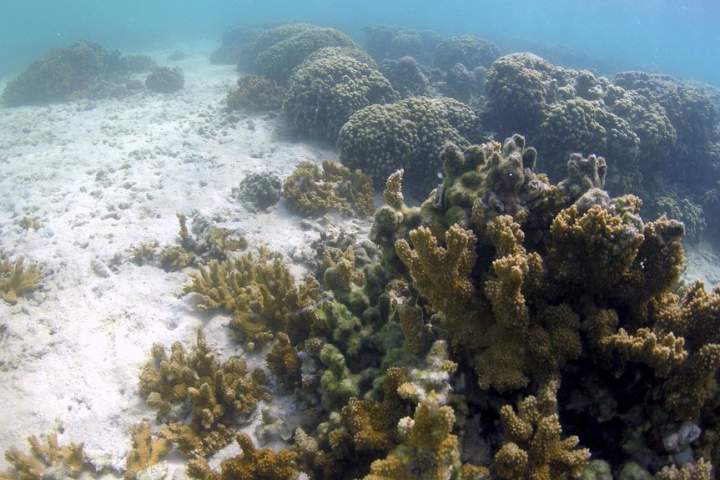Science
Coral Reefs Face Irreversible Decline, Urgent Action Required

Global warming has reached alarming levels, leading to a significant threat to the world’s coral reefs, which are now facing what scientists describe as an almost irreversible die-off. According to the Global Tipping Points report released on Monday, researchers warn that this situation represents the first “tipping point” in the collapse of climate-driven ecosystems. The report, compiled by 160 experts from around the globe, highlights the urgent need for action ahead of the COP30 climate summit scheduled for November in Brazil, near the Amazon rainforest.
The Amazon rainforest, a critical ecosystem, is now at risk of collapse once the average global temperature exceeds 1.5 degrees Celsius, largely due to ongoing deforestation. This represents a downward revision of the previously estimated threshold for the Amazon’s stability. Additionally, the report raises alarms about the potential disruption of the Atlantic Meridional Overturning Circulation (AMOC), a major ocean current crucial for maintaining mild winters in northern Europe.
Environmental scientist Tim Lenton from the University of Exeter, who led the report, stated, “Change is happening fast now, tragically, in parts of the climate, the biosphere.” While the report outlines dire scenarios, Lenton also pointed out some positive trends, such as renewable energy sources surpassing coal in electricity generation for the first time, as noted by the nonprofit think tank Ember. “Nobody wants to be just traumatized and disempowered,” he added, emphasizing the importance of collective agency in addressing climate issues.
The scientists involved in the report urged countries participating in COP30 to commit to reducing carbon emissions significantly. The urgency of their message stems from the rapid changes observed in nature, with average global temperatures already rising by 1.3-1.4 degrees Celsius above preindustrial levels, according to data from U.N. and EU science agencies.
The last two years have recorded the warmest temperatures on Earth, with marine heatwaves causing stress to approximately 84 percent of the world’s coral reefs, leading to widespread bleaching and, in many cases, death. Coral reefs play a vital role in marine ecosystems, supporting about a quarter of all marine life. For these reefs to recover, the global community must significantly accelerate climate action, aiming to lower temperatures back to just 1 degree Celsius above preindustrial averages.
Pep Canadell, a senior scientist at CSIRO Climate Science Centre in Australia, remarked that the report underscores the increasing scope and magnitude of climate change’s negative impacts each year. Currently, the world is projected to experience approximately 3.1 degrees Celsius of warming this century based on existing national policies, a trajectory that could lead to catastrophic consequences for both ecosystems and human societies.
As the countdown to COP30 continues, the findings of the Global Tipping Points report serve as a stark reminder of the urgent need for global cooperation and decisive action to combat climate change. The fate of coral reefs and other vital ecosystems hangs in the balance, demanding immediate efforts to reverse the course of climate-related destruction.
-

 Education3 months ago
Education3 months agoBrandon University’s Failed $5 Million Project Sparks Oversight Review
-

 Science4 months ago
Science4 months agoMicrosoft Confirms U.S. Law Overrules Canadian Data Sovereignty
-

 Lifestyle3 months ago
Lifestyle3 months agoWinnipeg Celebrates Culinary Creativity During Le Burger Week 2025
-

 Health4 months ago
Health4 months agoMontreal’s Groupe Marcelle Leads Canadian Cosmetic Industry Growth
-

 Technology3 months ago
Technology3 months agoDragon Ball: Sparking! Zero Launching on Switch and Switch 2 This November
-

 Science4 months ago
Science4 months agoTech Innovator Amandipp Singh Transforms Hiring for Disabled
-

 Education3 months ago
Education3 months agoRed River College Launches New Programs to Address Industry Needs
-

 Technology4 months ago
Technology4 months agoGoogle Pixel 10 Pro Fold Specs Unveiled Ahead of Launch
-

 Business3 months ago
Business3 months agoRocket Lab Reports Strong Q2 2025 Revenue Growth and Future Plans
-

 Technology2 months ago
Technology2 months agoDiscord Faces Serious Security Breach Affecting Millions
-

 Education3 months ago
Education3 months agoAlberta Teachers’ Strike: Potential Impacts on Students and Families
-

 Science3 months ago
Science3 months agoChina’s Wukong Spacesuit Sets New Standard for AI in Space
-

 Education3 months ago
Education3 months agoNew SĆIȺNEW̱ SṮEȽIṮḴEȽ Elementary Opens in Langford for 2025/2026 Year
-

 Technology4 months ago
Technology4 months agoWorld of Warcraft Players Buzz Over 19-Quest Bee Challenge
-

 Business4 months ago
Business4 months agoNew Estimates Reveal ChatGPT-5 Energy Use Could Soar
-

 Business3 months ago
Business3 months agoDawson City Residents Rally Around Buy Canadian Movement
-

 Technology2 months ago
Technology2 months agoHuawei MatePad 12X Redefines Tablet Experience for Professionals
-

 Business3 months ago
Business3 months agoBNA Brewing to Open New Bowling Alley in Downtown Penticton
-

 Technology4 months ago
Technology4 months agoFuture Entertainment Launches DDoD with Gameplay Trailer Showcase
-

 Technology4 months ago
Technology4 months agoGlobal Launch of Ragnarok M: Classic Set for September 3, 2025
-

 Technology4 months ago
Technology4 months agoInnovative 140W GaN Travel Adapter Combines Power and Convenience
-

 Science4 months ago
Science4 months agoXi Labs Innovates with New AI Operating System Set for 2025 Launch
-

 Top Stories2 months ago
Top Stories2 months agoBlue Jays Shift José Berríos to Bullpen Ahead of Playoffs
-

 Technology4 months ago
Technology4 months agoNew IDR01 Smart Ring Offers Advanced Sports Tracking for $169










